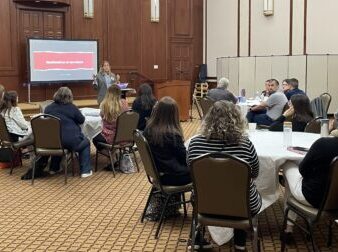
Last week, professionals who work with teens from across Greater MetroWest came together at Temple Beth Shalom in Livingston to learn how to navigate the conversation of antisemitism with their teen constituents. They represented the diverse array of community programs including supplemental education institutions, day schools, youth groups, and Jewish community centers.
The remarkable Dr. Rachel Fish delivered the keynote address. She is the co-founder of the nonprofit Boundless, an innovation engine re-imagining Israel education and combating Jew-hatred in North America.
Dr. Fish took us on an exploration of the contours of history that have led to the evolution of antisemitism. She managed to cover 2,000 years of history in a way that did not trivialize it nor make it feel overwhelming. We began to see the patterns and parallels in how Jew-hatred has manifested itself time and time again. We wrestled with the paradoxical and illogical nature of antisemitism and how it feeds those holding fast to conspiracy theories and radical ideologies. Dr. Fish rounded out our time together providing strategies, structure, and content to dialogue with our teens. The session left us all with the feeling that there is so much more to learn and the desire for more time with her.
After the keynote, we divided into smaller groups to dive deeper into three facets of antisemitism facilitated by Federation experts. Director of Holocaust Education Ilyse Shainbrown led a discussion on how the Holocaust plays a part in today’s antisemitism, Director of Jewish Community Relations Council Linda Scherzer spoke of antisemitism on college campuses, and I shared how antisemitism lives on social media. These sessions provided the resources to craft learning experiences with teens to proactively talk about these issues. By the end of the morning every single person walked away with something they could take back to their community.
Unfortunately, this training has become a necessity and not a luxury. New Jersey has experienced more than 400 reported antisemitic incidents in the past year. In our own Greater MetroWest there has been an uptick in bullying, antisemitic rhetoric, and hate crimes. On social media, our teens are coming across Jew-hatred rhetoric and iconography daily. We are now living in a different world than what our parents knew; we are in the age of unfiltered animosity. So, what can we do?
Know that you are not alone. Judaism teaches us that Kol Yisrael Arevim Ze Ba Ze (all Jewish people are responsible for one another). Should you ever encounter Jew-hatred, please reach out to Jewish Federation for support. Begin to educate yourself on what antisemitism looks like today. From Dog whistles to (((echoing))), language is now heavily coded, and you should know their meanings. Find out the platforms that are the mediums for young adults’ information and communication. If you think Facebook is where our teens get it, give me a call ASAP.
Three things that you can start doing today to help our youth (according to Dr. Fish):
1. Promote Critical Thinking. Too often people just take what they are told without follow up. It is easy to believe what you hear over and over. We need to help them ask the questions: Who is writing this? Who is the intended audience? What facts are included and what facts are omitted?
2. Use the Pause Button. Conversations around antisemitism get heated quickly. We need to strengthen our ability to stop in the middle of the intensity to foster a way for new dialogue. Practice any of these statements: Do you understand the history associated with this language or this concept? When you make a sweeping generalization about a particular people it stereotypes an entire community. Something you are saying doesn’t feel comfortable to me or is bothering me, but I’m not prepared to discuss why. Can we come back to this conversation?
3. Cultivate Brave Spaces. We are now in the age where we can no longer aim to craft spaces that are safe but ones that will empower our youth to share when it is uncomfortable. We need to uplift the value of compassion, intentionally engage with differences of opinion, practice civil discourse, welcome vulnerability, embrace growth mindset, and demonstrate moral courage.
Our work is only getting tougher to counter the misinformation that is out there or to educate the “don’t know” or “undecided” voices we encounter. JTEEN leans into these conversations with our teens. The leadership that is integral to every one of our programs builds these skills and values. It is our mission to ensure that no teen feels alone in the face of antisemitism.
I welcome anyone who is interested in learning more about how to have these conversations or what their teens see on social media to reach out to me at asiegel@jfedgmw.org.
You can learn more about Dr. Rachel Fish’s work here.

